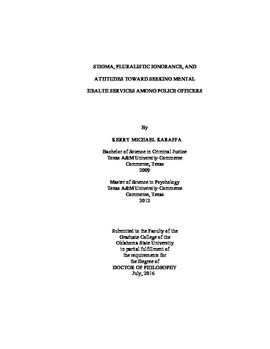| dc.contributor.advisor | Koch, Julie | |
| dc.contributor.author | Karaffa, Kerry Michael | |
| dc.date.accessioned | 2017-02-22T22:09:43Z | |
| dc.date.available | 2017-02-22T22:09:43Z | |
| dc.date.issued | 2016-07 | |
| dc.identifier.uri | https://hdl.handle.net/11244/48822 | |
| dc.description.abstract | Due to the stressors inherent in the law enforcement profession, police officers may be at increased risk for a variety of personal and mental health-related concerns. Despite these tendencies, officers have historically refrained from seeking psychological services. Several factors have been identified to explain their hesitance, including public stigma and self-stigma regarding mental health issues. In this study, sworn police officers in Texas and Oklahoma completed a 62-item online survey related to their attitudes toward seeking mental health services, mental health stigma, willingness to seek services, and perceptions of other officers' willingness to seek services. The first objective of the study was to identify the role of public stigma and self-stigma in predicting attitudes toward seeking mental health services among police officers. Consistent with the study hypotheses, the results indicate that public stigma and self-stigma were negatively correlated with attitudes toward seeking professional psychological help. Furthermore, self-stigma fully mediated the relationship between public stigma and attitudes toward seeking help, and the overall model explained 56% of the variance in attitude scores. Previous research has suggested that officers may tend to underestimate their colleagues' willingness to seek psychological services, thus demonstrating the concept of pluralistic ignorance. The second objective of the study was to develop a more comprehensive understanding of the pluralistic ignorance effect as it pertains to help-seeking attitudes among police officers, with regard to several common presenting concerns. As expected, results suggest that officers underestimated their colleagues' willingness to seek mental health services for family issues, depression, posttraumatic stress disorder, substance abuse, and physiological complaints due to stress. In other words, officers tended to believe that their peers were less willing to seek mental health services than they actually were. Implications for training and future research are discussed. | |
| dc.format | application/pdf | |
| dc.language | en_US | |
| dc.rights | Copyright is held by the author who has granted the Oklahoma State University Library the non-exclusive right to share this material in its institutional repository. Contact Digital Library Services at lib-dls@okstate.edu or 405-744-9161 for the permission policy on the use, reproduction or distribution of this material. | |
| dc.title | Stigma, pluralistic ignorance, and attitudes toward seeking mental health services among police officers | |
| dc.contributor.committeeMember | Crethar, Hugh | |
| dc.contributor.committeeMember | Harrist, Steven | |
| dc.contributor.committeeMember | Winterowd, Carrie | |
| dc.contributor.committeeMember | Thrasher, Ronald | |
| osu.filename | Karaffa_okstate_0664D_14483.pdf | |
| osu.accesstype | Open Access | |
| dc.type.genre | Dissertation | |
| dc.type.material | Text | |
| thesis.degree.discipline | Educational Psychology | |
| thesis.degree.grantor | Oklahoma State University | |
